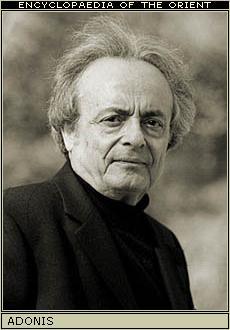Poemas para o Nobel
Ali Ahmed Said (Adónis, poeta sírio)

The sun in Aleph City would at times fall from its wheel
and grow dark to frighten the folks.
It, together with the moon, would often be detained and punished –
They would prostrate themselves and pray and beg permission to rise;
They would only be given permission to rise after three nights had
elapsed, three nights during which they would be confined to the
navel of heaven,
An angel would then come, take them by the horns, and force them to
rise from the east, from the Gate of Repentance.
Ko Un (poeta sul corenano)

A few days ago one of the dead came back from the tomb. Wearing the same old smile, his everyday clothes restored from the ashes, he gives a full account of himself. All around him shines a watery light. He talks his full, then leaves like a letter. Beside me my young brother, body and heart purified, sees him off.
We spend every afternoon like this, greeting and saying goodbye. Occasionally I hear the dead of ancient Korea talking. They usually omit a few things, I think. How could they reveal everything in one brief resurrection? Their story, before and after they died, is more than a few words can express.
After seeing them off, my brother stays silent like an empty bowl. Dressed lightly, he always welcomes our visitors from beyond, with clear glass barriers of taboo lining the hallway. Responding simply in a quiet voice to what they say, his heart is open, ready to receive everything, alone.
Every afternoon we welcome and send off guests from beyond the tomb. The light beyond the window is a sundial by which we tell the time. Each word my brother hears from the dead is first dried in the sun, then preserved. Truly, this world is the other world, huge and vast; this world is a tomb. Tomorrow, let's not send off those that come, let's have them live with us.
A lista dos favoritos deste ano incluí, naturalmente, outros nomes. O meu preferido, contudo, é Ko Un. Se por um lado é extremamente emocional, não é romântico. A sua simplicidade (espontaneidade?), humor e paradoxos, criando um sistema discursivo não familiar e imprevisível são características assinaláveis. Allen Ginsberg definia-o como um “a magnificent poet, a combination of Buddhist cognoscente, passionate political libertarian and natural historian”. O projecto Ten Thousand Lives é uma celebração da natureza humana enquanto poesia. Trata-se de uma biografia poética das pessoas que o autor conheceu, desde a sua infância. Ko Un considera uma obrigação comemorá-las nas palavras e este épico conta já com 20 volumes. É uma obra extraordinária, quer na sua concepção quer na sua dedicação. Ko Un já tem sido um dos favoritos em outros anos. Espero que desta vença!


<< Home